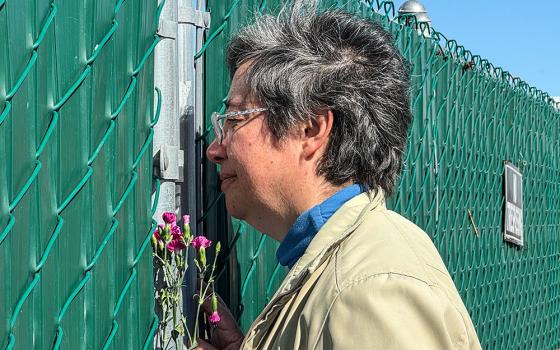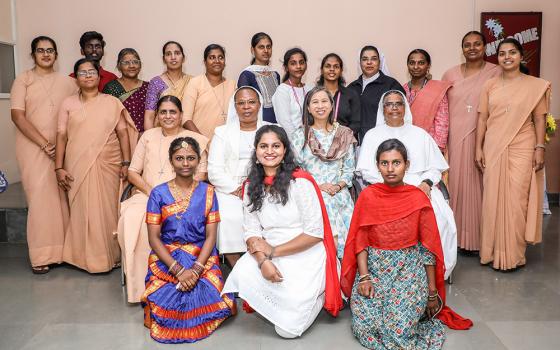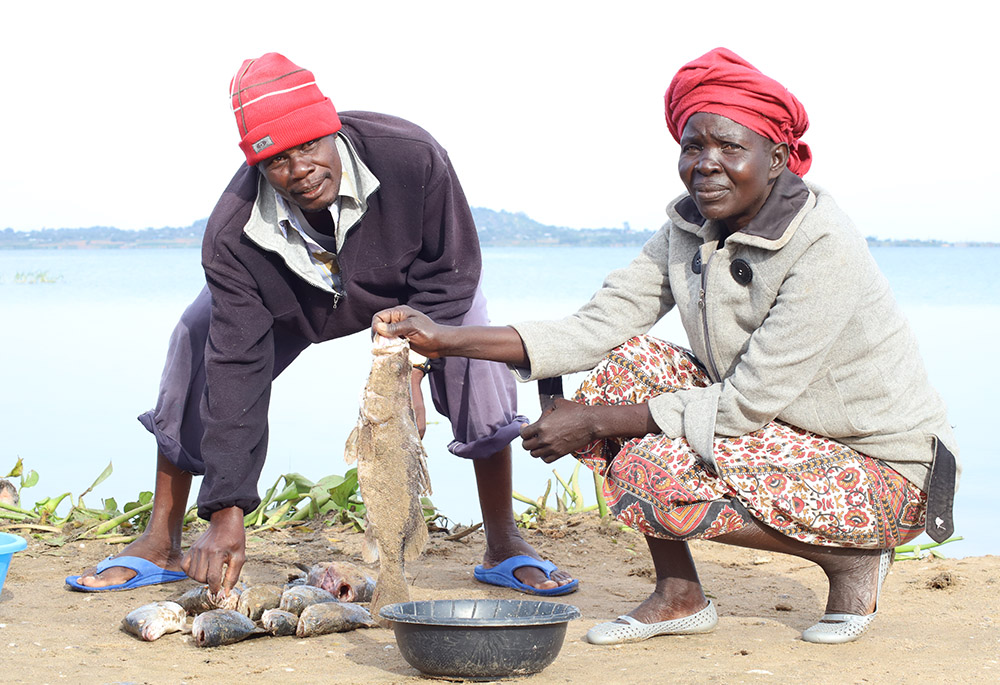
Alice Wandago, 46, inspects fish caught by a fisherman by Lake Victoria in Migori on Nov. 5, 2021. Wandago, who owns a boat donated by the church, no longer engages in sex with fishermen to get the best catch of the day, a system known in the local Luo language as "jaboya." She helps other women who come to buy fish at the lake without having sex with fishermen. (GSR photo/Doreen Ajiambo)
The blue waters of Lake Victoria here, in Kenya's third largest city, stretch as far as the eyes can see. Fishing boats row in and out of the port as buyers, especially women, queue up to purchase the catch of the day — commonly tilapia and Nile perch.
Fish is the main currency in southwestern Kenyan cities on the lake. In early morning, women who sell fish in the market for a living wait on the shore to trade sex for fish — or even just for the opportunity to get it for half price.
With fish now in severe shortage, a woman has to compete to acquire it. When she is approached, she will accompany a fisherman to a nearby road leading from the shore to meet her part of the transaction in one of the shanties, then return to the shore to pick up her allotment.
Or if she is a regular customer, she may get the fish right away and return later to his shanty. Failure to do so means she will be shut out from getting any fish in the future once the fisherman puts out the word to all.
This practice dates back decades and has become a tradition in the Lake Victoria economy. It is called jaboya in the local Luo language of the people living around the lake and means "sex for fish."

On the shores of Lake Victoria in Kisumu in southwestern Kenya, boats row in and out, some full of fish while others carry fishermen with nets. On roads near the water, women fishmongers often engage in transactional sex with fishermen — a practice that contributes to Kenya's high rate of HIV/AIDS. (GSR photo/Doreen Ajiambo)
"When I started my business of selling fish, it was difficult to get fish because fish were being sold to only specific women who sell their bodies," said Rose Akinyi. She is now among women fishmongers practicing jaboya. "I was forced to have sex with fishermen, and in return they gave me fish. This trend didn't stop. I am still exchanging sex for fish."
Even if a woman has money, fish is in such short supply there is little to buy. The fishermen require sex in addition to cash for the fish. Sometimes they will give a girl or young woman fish for free, but they admit that generosity is related to whether she is beautiful and agrees to have sex.
The 57-year-old mother of eleven says the situation has recently been aggravated by a worrisome combination of overfishing and warming temperatures, leaving many local fishmongers struggling to survive.
"The fish in the lake has reduced, and the fishermen are now taking advantage of the situation to sleep with the women," said Akinyi as she descaled her fish and slit them open to remove their innards by the lake. "In fact, you have to pay for the fish and still engage in sex. Since there are not enough fish, you need to have many sexual partners to have enough to sell at the market."
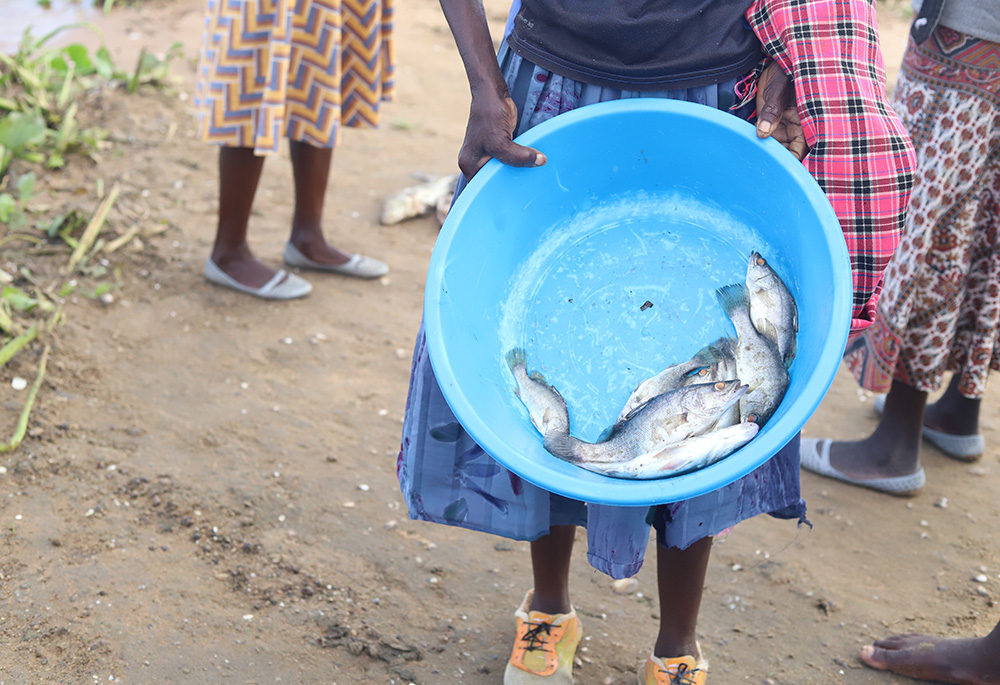
A woman holds fish from Lake Victoria in Kisumu in southwestern Kenya on Nov. 5, 2021. She says she sleeps with fishermen who offer the best deal on any given day. (GSR photo/Doreen Ajiambo)
The practice has fueled HIV/AIDS infections in the region, prompting the Catholic Church to intervene.
Kisumu, a town 218 miles from the country's capital, Nairobi, has an HIV prevalence rate of 16.3%, according to the country's 2018 National Aids Control Council report, responsible for coordinating stakeholders in the response to HIV and AIDS in Kenya.
Archbishop Philip Anyolo, the head of the Nairobi Catholic Archdiocese, lamented the situation saying jaboya was widespread around Lake Victoria, the biggest lake in Africa, bordered by Kenya, Tanzania and Uganda. (The lake's area, about the size of West Virginia, is divided among the three countries, with Kenya's share, including fishing rights, only 6%.)
Anyolo, who served as the archbishop of Kisumu before recently being transferred to Nairobi, told Global Sisters Report that most women living around the lake were being forced to sell sexual favors to fishermen to make a living for themselves and their families.

Religious sisters are seen walking through the busy Dunga Beach market in Kisumu, a town located 218 miles from the country's capital, Nairobi. Sisters here are working to end the dangerous sexual practices that have become widespread in the fishing community. (GSR photo/Doreen Ajiambo)
"Women should be respected, and this kind of practice goes against human dignity and respect for women," Anyolo said.
Religious sisters serving in the region echo Anyolo's assessment.
"This vice, which has been in the region for years, has affected the fishing community in a way that most youth in this area grow up knowing this is the order of the day," said Sr. Josephine Musungu, a member of the Sisters of Mary of Kakamega.
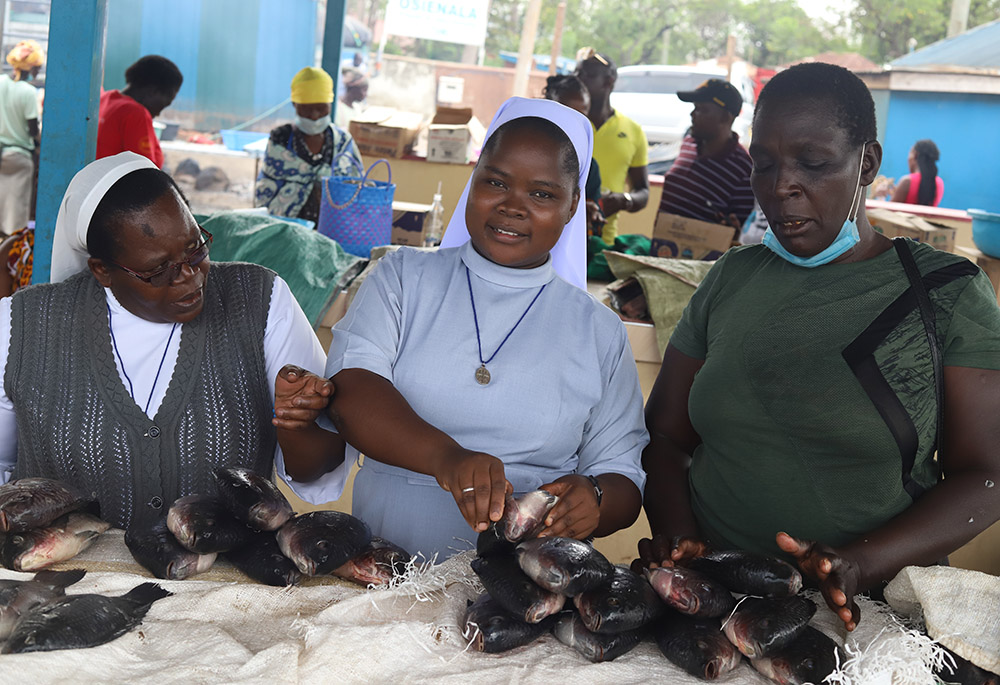
Srs. Christine Auma (from left) and Josephine Musungu, who are members of the Sisters of Mary of Kakamega, interact with women fishmongers at Dunga Beach market in Kisumu in southwestern Kenya on Nov. 6, 2021. The sisters are touring markets and other social places to create HIV awareness and empower women to abandon the sex-for-fish trade. (GSR photo/Doreen Ajiambo)
Jaboya and HIV
Besides the HIV dangers, jaboya has been blamed for gender inequality and poverty. Southwestern Kenya, which has six counties — Kisumu, Siaya, Homa Bay, Migori, Kisii and Nyamira — is one of the poorest regions. In Kisumu, for instance, 48% of the population lives on less than $1 a day compared with the national rate of 29%, according to 2019 Kisumu County data.
Fr. James Omondi, the presiding priest at Nyandiwa parish within the Catholic Diocese of Homa Bay, said the county of Homa Bay has the highest rate of HIV/AIDS within the country, with a prevalence rate of 26%, according to 2018 National AIDS Control Council data. He said fishermen having sex with multiple women fish sellers on a daily basis was the main factor behind the high HIV rates around the lake.
"It makes me sad," he said, adding that the practice was very common within the area he serves. "Fishermen and women fishmongers are engaging in sexual activities without caring about their health. Marriages are also ending due to jaboya practice."
Some experts say gender inequality has contributed to the high HIV prevalence in the fishing communities. Along Lake Victoria, mostly men own boats and go fishing while women handle the sales at market, they said.
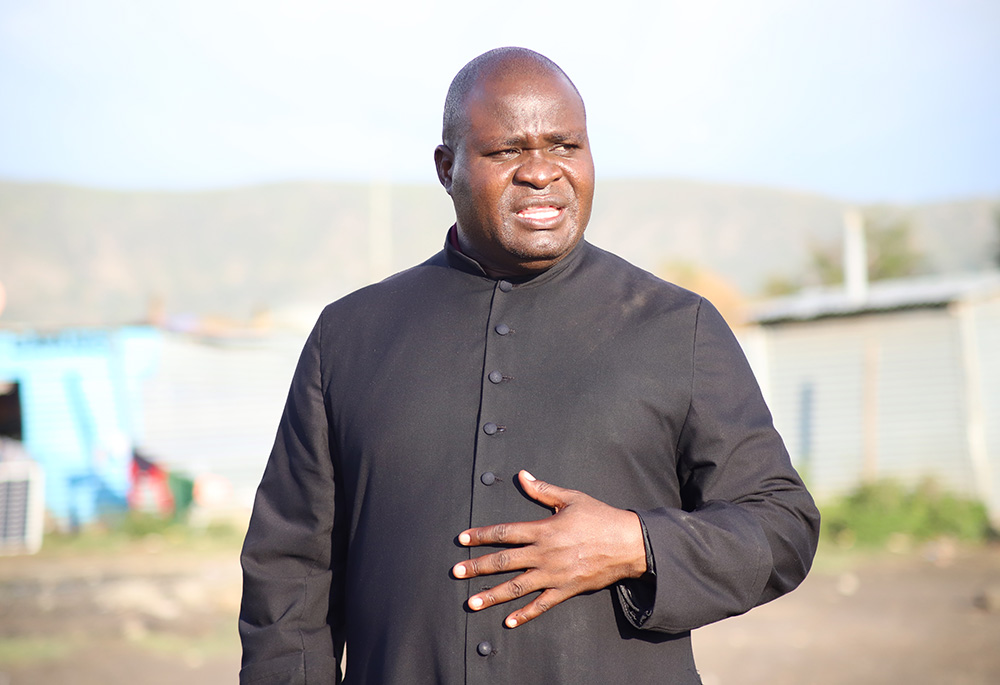
Fr. James Omondi is the presiding priest at Nyandiwa parish in the Catholic Diocese of Homa Bay in southwestern Kenya. He engages women regarding the dangers of the sex-for-fish practice. He empowers them with boats and money to start other businesses while challenging the age-old tradition of Jaboya. (GSR photo/Doreen Ajiambo)
So whenever there is a shortage of fish, fishermen prefer to sell fish to women who will agree to sex, said Dr. Kenneth Ochieng' Ombogo, director of public health in Migori County.
"The county identifies the main HIV driving factors that are linked to the various socioeconomic activities, among them sex for fish, which is prevalent along the beaches," said Ombogo, noting that individuals around the lake rarely use condoms as it's seen as an indication of promiscuity.
Musungu said jaboya has recently increased due to the poverty among people along the lake. The nun said those women who practice it do so because they have no other option to earn a living. The practice has led families to lose their loved ones to AIDS, she said, explaining that the situation has yielded a high number of orphans within the region, with some children flooding the streets of Kisumu and other towns.
"People in this region do fishing as a way of earning a living. It's their main economic activity, but it has affected their lives," she said. "Fishing in this region is like an illegal business. You have to give something, and you get something back. So if I'm a fisherman, I can fish, get the fish, and since that's the sole available thing around, I provide you with fish, then reciprocally we engage in sex as a type of payment."
"These degrading activities that are caused by mainly poverty lead to a high rate of HIV," she added.
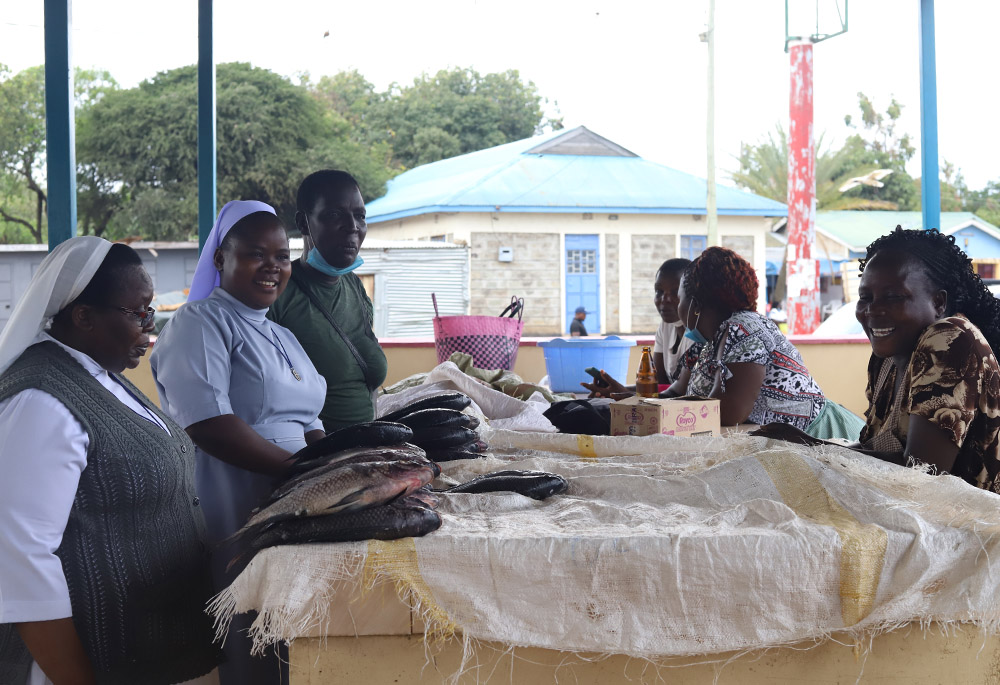
Srs. Christine Auma and Josephine Musungu, who are members of the Sisters of Mary of Kakamega, engage women at the Dunga Beach market in Kisumu on Nov. 6, 2021, regarding the dangers of the sex-for-fish practice. (GSR photo/Doreen Ajiambo)
Jackline Achieng, a 32-year-old mother who started selling fish in 2016, says poverty pushed her to engage in jaboya after her husband died, leaving her with three children she couldn't feed and educate.
"I was very young and beautiful when I started a fishing business to take care of my children," she said. "Every fisherman was interested in me, but when I refused to have sex with all of them, they denied me fish and life became difficult. I was finally forced to give in, and now I have HIV."
Achieng doesn't know how many people she has infected with HIV/AIDS. "I don't care when I infect people with HIV because I was also infected while trying to look for means of feeding and educating my children," she said at her fish stall at Dunga Beach market in Kisumu. "I am now used to this business. I sleep with three different men every week to boost my fish business."
However, some of the fishermen here defended themselves, saying they were engaging in jaboya to assist women in continuing with their business.
"I am jaboya, and we sell fish to women around here. We help women who don't have money," said Geoffrey Otieno, one of the fishermen working at Dunga Beach. He noted that the majority of the women he sleeps with are either widowed or separated. "We simply sleep with them and give them fish. Those women who do not want to have sex with us don't get fish."
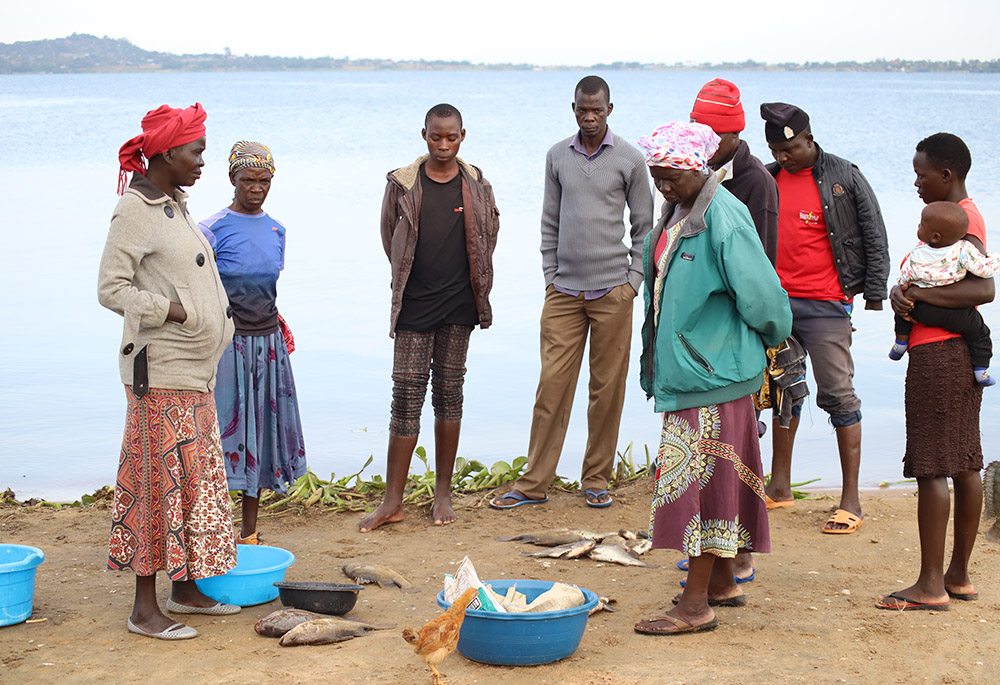
Women fishmongers wait for the fishermen to bring fish to buy and then sell them in their local markets. Along Lake Victoria, in southwestern Kenya, women fishmongers often engage in transactional sex with fishermen — a practice that contributes to Kenya's high rate of HIV/AIDS. (GSR photo/Doreen Ajiambo)
Churches, NGOs take part
In 10 of its 17 Sustainable Development Goals, the U.N. sets an agenda for countries and nongovernmental organizations to reduce the HIV/AIDS prevalence among people.
The Catholic Church and a group of local nongovernmental organizations are working to end the risky tradition and inspiring women to earn a livelihood in safer ways.
"The church promotes values, stands for the dignity of women and condemns the jaboya practice," said Anyolo. "I have been mobilizing priests in the region to reach out to families affected by the practice and help them out."
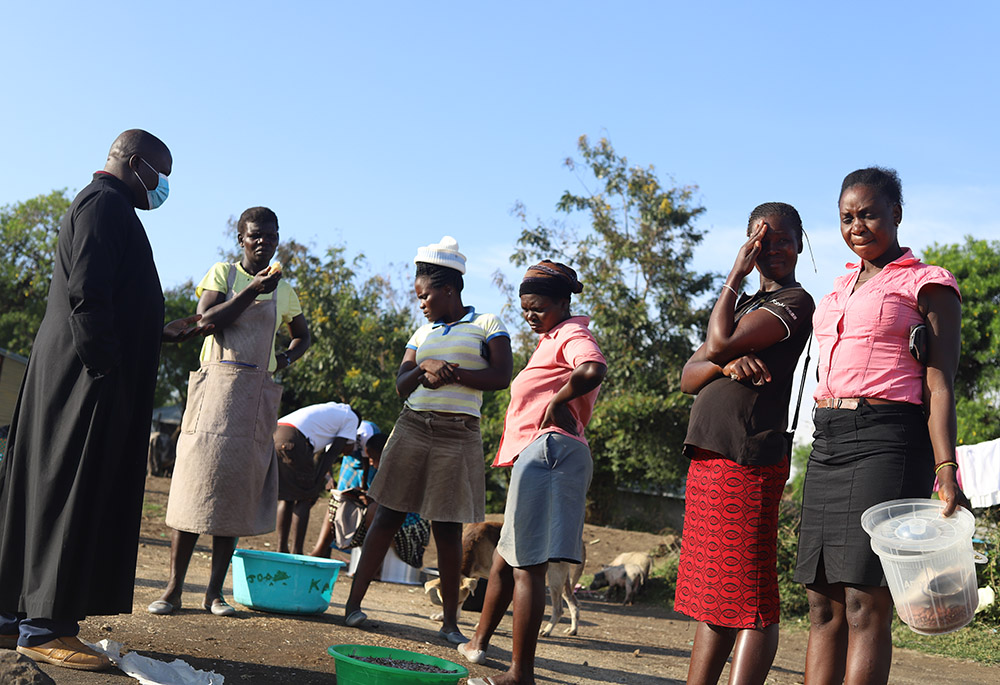
Fr. James Omondi, the presiding priest at Nyandiwa parish in the Catholic Diocese of Homa Bay in southwestern Kenya, educates women regarding the dangers of the sex-for-fish practice. He regularly visits the beach to interact with women to understand their problems and serve them better. (GSR photo/Doreen Ajiambo)
Religious sisters from various congregations, such as the Sisters of the Blessed Virgin, Tabaka, in Migori, have been instilling moral values to residents and empowering women financially.
Musungu, who has worked for years with beach communities to raise HIV awareness, said they hold sensitization meetings and workshops with those involved in the sex trade.
"As a church, we regularly offer counseling sessions every Sunday especially to women and youth on the dangers of HIV and effects of engaging in sex for fish activities," she said, adding that they also try to reach out to fishermen.
Musungu said the church, through various donations, has been able to empower a few women by buying them boats to run their own fishing businesses. More women now employ men to go fishing using their boats, she said, noting that the move has prompted men to show respect to women and treat them as managers.
Other women have been provided with the skills and money to start alternative businesses such as tailoring, embroidery, computer services, catering and hospitality.
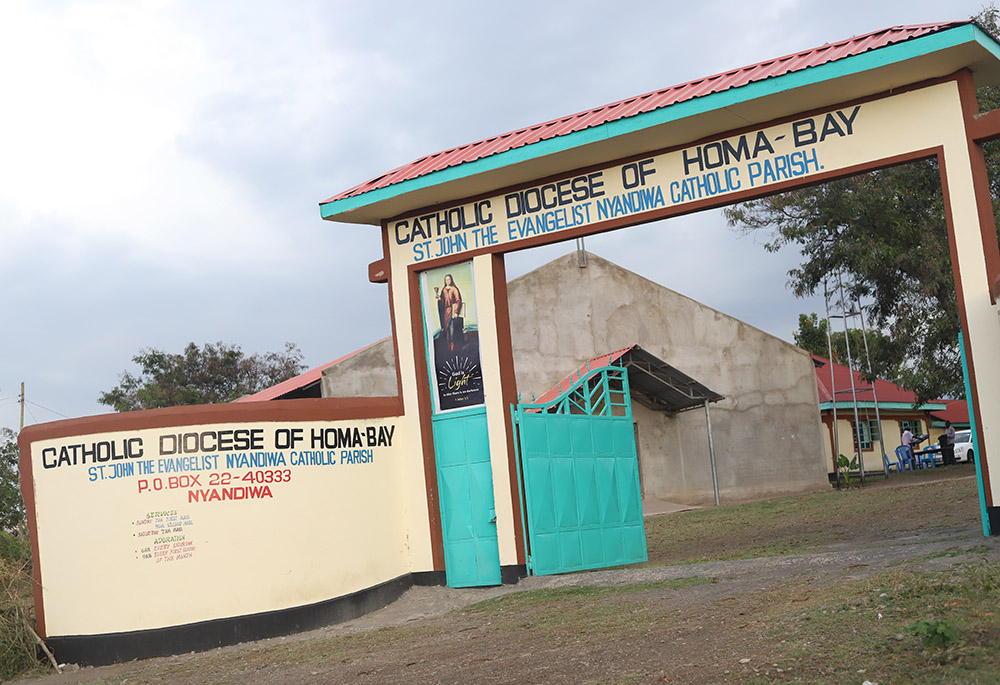
The main entrance of St. John the Evangelist Nyandiwa Catholic parish in the Homa Bay diocese in southwestern Kenya. The congregants here are working to end the dangerous sexual practices that have become widespread in the fishing community. (GSR photo/Doreen Ajiambo)
In the county of Homa Bay, Omondi is leading congregants in the "No Sex for Fish" project to help women fishmongers abandon the jaboya practice. Here, congregants contribute money that is used to purchase boats for women so that they can run their fishing businesses.
Through the help of local NGOs, the church has also facilitated some of the women to become fish farmers, using freshwater cage fish farming or floating cage aquaculture. Reared in metal cages and fed artificially, the fish are harvested only when they mature, Omondi said, adding that the women breed only male fingerlings, or juvenile fish, to avoid overbreeding and to help the fish mature faster.
The method ensures there's enough fish despite stocks in Lake Victoria, and the women don't need to beg men for fish in exchange for sex, he said. However, Omondi says the lack of finances has prevented his parish from eradicating jaboya.
"We have been successful as a church to reduce the spread of HIV/AIDS through sharing the word of God and empowering women," he said, adding that the demand for help is high. "However, our parish is so poor. Women come to us with the hope of getting financial support, but we don't have much to offer them. Sadly, some of them end up going back to trading sex for fish."
Advertisement
Alice Wandago is one of the women who the Catholic Church has helped. The church bought her a boat, and she is also assisting other women to escape jaboya.
"I no longer depend on fishermen to survive," said the 46-year-old mother of four. "I own my own boat, and I help all women who come here to buy fish to get them without having sex with fishermen."
Meanwhile, Akinyi hopes that this kind of help will one day reach her and other women who are still slaves to fishermen.
"I need to be empowered with a boat or some money to start an alternative business," she said. "I don't like this business of sleeping with fishermen, but I am forced to do it because of poverty."

